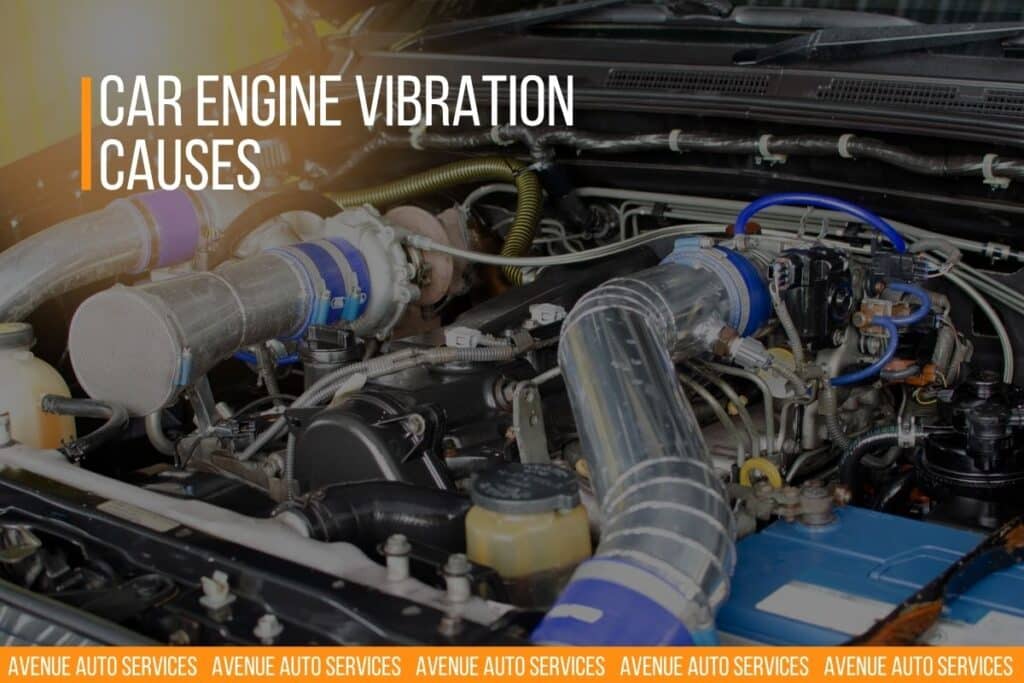If your car’s engine is vibrating more than usual, don’t ignore it. Engine vibrations are often a warning sign of underlying issues that, if left unchecked, can lead to bigger and more expensive problems. Whether you notice the shaking at idle, during acceleration, or while driving at high speeds, understanding the car engine vibration causes can help you identify what’s wrong and fix it before it gets worse.
We’ll break down the most common reasons your engine might be vibrating – and what you should do about them.
1. Worn-Out Engine Mounts
Engine mounts are designed to keep your engine secured to the vehicle’s frame and absorb vibrations. Over time, these mounts can wear out or break, causing your engine to shake—especially during startup or when idling.
Symptoms:
Excessive vibration when starting or idling
Loud clunking noises under the hood
Misaligned engine position
Pro Tip: If the vibrations increase when accelerating, your mounts could be completely damaged. Book a Suspension or mount check to stay safe.
2. Misfiring Engine Cylinders
A misfire occurs when one or more engine cylinders fail to fire properly. This imbalance causes uneven power delivery and leads to noticeable vibrations, especially under load or acceleration.
Common Causes:
Faulty spark plugs or ignition coils
Fuel injector problems
Dirty air filters or poor fuel mixture
Solution: Have your vehicle’s ignition system checked. Misfires left unresolved can lead to more severe engine damage or increased fuel consumption.
3. Damaged or Unbalanced Drive Shaft
If your car vibrates while accelerating, the issue might be with the drive shaft. When it’s bent, damaged, or unbalanced, it creates a rotational imbalance, causing strong vibrations through the floor or steering wheel.
Internal Fix: Schedule a Drive Shaft inspection to diagnose any mechanical imbalances or damage.
4. Loose or Broken Engine Components
Loose bolts, broken brackets, or even detached engine parts can create heavy vibrations. These mechanical imbalances often worsen with engine RPMs and may be accompanied by rattling or clunking noises.
Prevention Tip: Regular servicing can help catch these issues early. Don’t skip your maintenance schedules—minor parts failures can trigger major engine vibrations.
5. Timing Issues or Faulty Timing Chain
When your engine’s timing is off, the internal combustion process becomes inefficient. This leads to rough idling, misfires, and severe vibrations. A stretched or worn-out timing chain is a common culprit.
Warning Signs:
Engine warning light
Rough engine idle
Vibrations during acceleration
Service Suggestion: If you suspect timing problems, ask for a Car Gearbox or timing chain inspection to avoid breakdowns.
6. Faulty or Clogged Fuel System
A disrupted fuel flow due to a dirty fuel injector or a clogged fuel filter can cause your engine to run lean or rich—either of which may result in shaking or jerky acceleration.
Resulting Symptoms:
Loss of power
Poor fuel efficiency
Unstable engine RPM
Tip: Get a professional fuel system cleaning done during your next engine service to avoid long-term issues.
7. Broken or Worn Spark Plugs
Old or damaged spark plugs are one of the simplest yet most common car engine vibration causes. Without a strong spark, your engine’s combustion process is uneven, causing jerks and shakes.
Quick Fix: Replacing spark plugs is an affordable and fast way to restore engine smoothness. Include this in your routine engine tune-up.
8. Electrical System Issues
Intermittent current flow, battery issues, or alternator faults can also cause the engine to vibrate. While it’s less common, electrical inconsistencies often result in unstable engine RPM and rough idling.
Pro Maintenance Tip: Book an Electrical Failure diagnostic to ensure your vehicle’s alternator and battery are supplying consistent power.
9. Faulty Air or Vacuum Hoses
Leaks in vacuum lines or air intake hoses disturb the engine’s air-fuel mixture. This causes the engine to operate unevenly, leading to performance drops and vibration at idle or during acceleration.
Signs:
Hissing sound under the hood
Irregular idle
Poor throttle response
Fix It Fast: Replacing damaged hoses is inexpensive and helps restore fuel efficiency and engine smoothness.
When to Seek Professional Help
If your car’s vibration is consistent, increasing, or accompanied by dashboard warning lights, it’s time to consult an expert. Continued driving can lead to serious damage or complete engine failure.
At Avenue Auto Services, we specialize in advanced diagnostics for engine vibration, suspension issues, drive shafts, ECM faults, and more. Our expert technicians use state-of-the-art equipment to quickly pinpoint the issue and fix it with precision.
Final Thoughts
Understanding the various car engine vibration causes helps you stay proactive about your vehicle’s health. While some issues like spark plugs or engine mounts are easier to fix, others—like timing chain failure or fuel system malfunctions—require expert intervention.
By staying alert to the signs and scheduling timely maintenance, you not only save on repair costs but also ensure a smoother and safer driving experience across the UAE.




